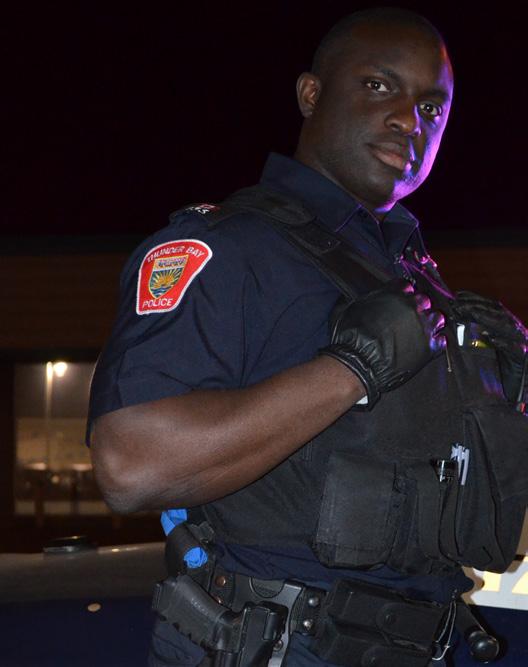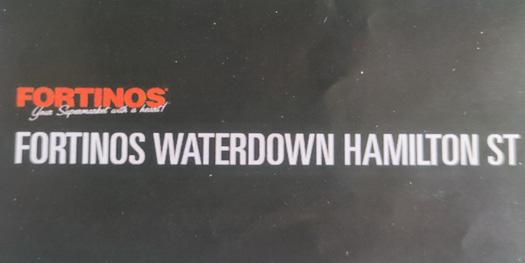
7 minute read
Tanka Awosika: Improving Lives Through Resolution, Reconciliation and Resilience
Tanka Awosika Thunder Bay Police Association
By Heather Hogan
Constable Olamitanka (Tanka) Awosika has been a passionate School Resource Officer with the Thunder Bay Police Service for the past four years and a proud member of the Thunder Bay Police Association. He started serving 13 years ago – first in uniform patrol, then in the Traffic Unit, and now in the Community Services Branch.
His policing journey was rooted in Nigeria. As a child, he dreamed of joining the military, an aspiration fueled by the photos of his grandfather in military uniform, Ayoola Awosika, who served in World War II. Despite his grandfather’s passing when he was only three, his impactful legacy lives on through Tanka’s sense of duty to serve.
Tanka is part of Thunder Bay Police Chief’s Honour Guard and when participating in Remembrance Day ceremonies, he often thinks about his grandfather’s selfless service for the freedom that all Canadians enjoy today.
A new life, education, and policing career in Canada
At the age of 18, Tanka left his home country and came to Canada as an international student. He studied hard to earn his diploma in mechanical engineering technology from George Brown College. He then attended Lakehead University, where he graduated with a double major in math and physics. Tanka settled in Thunder Bay with his wife, where he couldn’t quash his desire to serve and started the process of becoming a police officer.
Policing complex in a cross-cultural society
“Upon arriving in Canada, I realized that within Canada, there is a disconnect and distrust between many communities, especially between the Indigenous population and police. This was particularly surprising for me as a Nigerian and a Black man, learning about the historical complexities in Canada.”
Tanka’s lived experience differed, and it took him time to learn Canada’s history.
This allows him to approach policing in schools from a crosscultural view. “Racism is real, and it’s a problem. My approach is centred on the perspective of us trying to learn about each other.”
As a School Resource Officer, Tanka doesn’t have the same lived experience as a Black person who grew up in Canada and strives to understand other perspectives.
Building trust between students and police
Tanka connects with students and helps them get the support they need from the police. He cares about the students he serves and prefers to use diversion and mediation methods to resolve issues within the school.
“We’re trying to educate children and create resolutions to help build trust and create a positive relationship with law enforcement at an early age.”
Thunder Bay is the most populous municipality in Northwestern Ontario. In 1970, the City of Thunder Bay was formed by merging the cities of Fort William, Port Arthur, and the geographic townships of Neebing and McIntyre. The city takes its name from the immense Thunder Bay at the head of Lake Superior.
More than 50 schools are in the city, and Tanka is responsible for serving 25 of them in south Thunder Bay. “I connect with the principals and vice-principals. I call them my coworkers, and they call me when an issue requires intervention.”
He also proactively delivers presentations on major areas of concern to students, including online safety and bullying. At times, he is called to the schools to respond to an issue such as assault.
“If the incident, is an assault, bullying, threat or anything that is of criminal nature, we intervene to find a solution. Sometimes the parents and involved students come to a resolution; other times, we go through youth diversion instead of proceeding with a criminal charge; and worse case scenario, when there is a need, a criminal charge for something more serious.”
Basketballs, colouring, serving youth in 25 schools
Tanka works as part of a team with Community Outreach and often pulls in others as needed, including members of the Community Inclusion Team.
He also works with staff and students at Dennis Cromarty High School and Matawa Education and Care Center, both institutions governed by Indigenous organizations with their own liaison officers under the Community Inclusion Team (CIT).
His role as a school resource officer came with built-in challenges as he and his partner started during the COVID-19 pandemic and immediately had to adapt to working with schools in lockdown. After the lockdown, he noted adverse effects stemming from the pandemic, such as heightened levels of violence resulting from long isolation periods, reduced physical activity, and increased stress among young people. The resocialization of students is a major hurdle he and the school administration are still struggling to overcome.
There is a high demand for Tanka’s time in the schools. But he is only one person, overseeing community policing for 25 schools.
He is a big proponent of being in uniform and showing the students who police officers are to increase trust. When he visits high schools, he enjoys walking through the cafeteria, playing basketball in the gym, or weightlifting with the kids in the weight room. In elementary school, he reads books, colours, and participates in circle time.
Police, trust, and Indigenous communities
“I find that as police officers, a common personality trait is jumping to solve a problem immediately and then moving on to the next. Well, that doesn’t work with Indigenous communities,” Tanka says.
“Relationships are important. They want to see you, they want to know you care about them, they don’t just want to hear what you have to say, they want action. That is a constant challenge because we are understaffed and have limited time for meaningful community engagement.”
In recent years, various critical reports, including those from an expert panel last spring, have exposed systemic racism within the Thunder Bay Police Service towards Indigenous communities. The panel also identified a significant “profound lack of trust” in the police within Indigenous communities.
Better policing through resilience and reconciliation training
“To help address the issues that were raised in the report, I have been delivering reconciliation training with all the officers.”
Tanka suggests that police officers must slow down and connect with their communities.
“When a police officer is tired, stressed out, or overworked, they may not be at their best when dealing with people on their worst days.”
Resiliency training helps officers tackle trauma
Tanka says the resiliency training course at the Thunder Bay Police Service helps officers better cope with the often traumatic nature of their jobs. The Comprehensive Officer Resilience Trainthe-Trainer program, an initiative of the FBI National Academy Associates, was first held by the service in 2019, just before the COVID-19 pandemic. The police service is now returning the program to support police personnel.
A toolbox of 12 modules taught in two days was the first course of its kind in Canada. It leverages an officer’s mental, physical, social, and spiritual aspects to help them “promote an environment for well-being” at their workplace. Tanka was one of eight police personnel trained to teach the modules.
“Trauma is not necessarily based on an event that occurred, but how we process that event,” he states. “Resiliency training helps us understand how our brain works so that we can learn new skills to process traumatic events in a way that doesn’t lead to occupational stress injury.”
Tanka will continue to deliver training to his coworkers as he embarks on the next stage of his career as a Child Abuse Investigator with the Criminal Investigations Branch.
“My time as a school resource officer gave me a chance to connect with children and positively influence their experience with police. I look forward to continuing to follow my passion of helping children and eagerly anticipate the positive impact I can make in their lives to improve their situation.”















